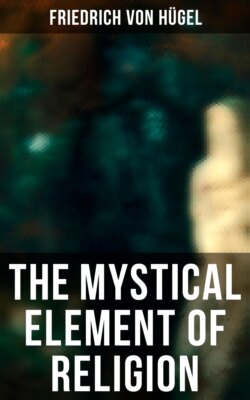Читать книгу The Mystical Element of Religion - Friedrich von Hügel - Страница 44
На сайте Литреса книга снята с продажи.
2. The two crises of the soul, when it adds Speculation to Institutionalism, and Mysticism to both.
ОглавлениеNow all this is no fancy scheme, no petty or pretty artificial arrangement: the danger and yet necessity of the presence of these three forces, the conflicts and crises within and between them all, in each human soul, and between various men and races that typify or espouse one or the other force to the more or less complete exclusion of the other, help to form the deepest history, the truest tragedy or triumph of the secret life of every one of us.
The transition from the child’s religion, so simply naïve and unselfconscious, so tied to time and place and particular persons and things, so predominantly traditional and historical, institutional and external, to the right and normal type of a young man’s religion, is as necessary as it is perilous. The transition is necessary. For all the rest of him is growing,—body and soul are growing in clamorous complexity in every direction: how then can the deepest part of his nature, his religion, not require to grow and develop also? And how can it permeate and purify all the rest, how can it remain and increasingly become “the secret source of all his seeing,” of his productiveness and courage and unification, unless it continually equals and exceeds all other interests within the living man, by its own persistent vitality, its rich and infinite variety, its subtle, ever-fresh attraction and inexhaustible resourcefulness and power? But the crisis is perilous. For he will be greatly tempted either to cling exclusively to his existing, all but simply institutional, external position, and to fight or elude all approaches to its reasoned, intellectual apprehension and systematization; and in this case his religion will tend to contract and shrivel up, and to become a something simply alongside of other things in his life. Or he will feel strongly pressed to let the individually intellectual simply supplant the institutional, in which case his religion will grow hard and shallow, and will tend to disappear altogether. In the former case he will, at best, assimilate his religion to external law and order, to Economics and Politics; in the latter case he will, at best, assimilate it to Science and Philosophy. In the first case, he will tend to superstition; in the second, to rationalism and indifference.
But even if he passes well through this first crisis, and has thus achieved the collaboration of these two religious forces, the external and the intellectual, his religion will still be incomplete and semi-operative, because still not reaching to what is deepest and nearest to his will. A final transition, the addition of the third force, that of the emotional-experimental life, must yet be safely achieved. And this again is perilous: for the two other forces will, even if single, still more if combined, tend to resist this third force’s full share of influence to the uttermost. To the external force this emotional power will tend to appear as akin to revolution; to the intellectual side it will readily seem mere subjectivity and sentimentality ever verging on delusion. And the emotional-experimental force will, in its turn, be tempted to sweep aside both the external, as so much oppressive ballast; and the intellectual, as so much hair-splitting or rationalism. And if it succeeds, a shifting subjectivity, and all but incurable tyranny of mood and fancy, will result,—fanaticism is in full sight.
